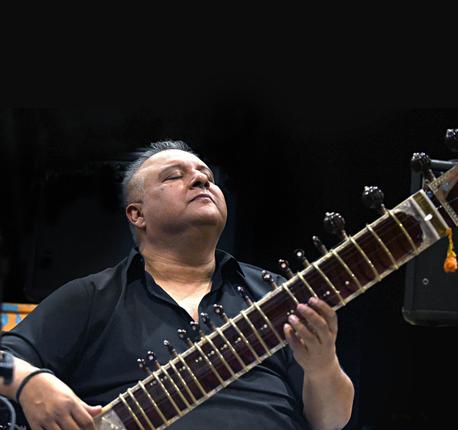Kolkata, WEST BENGAL / NEW DELHI :

/ The Hindu
Chennai:
The sitar exponent gave lessons on music and life at a students’ workshop recently.
It is a long winding road from Chennai to Cheyyur. Suddenly in the middle of wilderness you spot a well-designed concrete patch — the Swarnabhoomi Academy of Music. As you drive past the main gate to reach the campus, shaped like a grand piano, bright morning rays light up the clear, vast skyline.
Walking past two huge murals at the entrance, you enter a darkened hall with the spotlight on Shujaat Khan, his fingers gliding over the gleaming sitar strings. Gentle notes, rich with classicism, cut through the silence. The young audience sits enthralled. After a brief sketch of a raag, the Grammy-nominated sitarist talks endearingly, in flawless English, about his experience, experiments and the trials and triumphs of being a musician.
The session, part of a two-day camp on Indian music is no sombre class. Shujaat, son of maestro Ustad Vilayat Khan, is at his wittiest best interacting with the youngsters. He encourages them to ask questions, express their opinion and even invites two of them to join him on stage.
“I was born into a family of musicians. If I didn’t do this there wouldn’t have been any option because I was bad at everything else. I loved driving but I thought I couldn’t make a living out of it. The only thing I was slightly good at was music,” he says sipping coffee. “But it’s not easy to make a career in music since there are few people who can judge between ordinary and outstanding.”
Like most celebrity children, who struggle to forge an identity of their own, it was an emotional quest for Shujaat to reach out to his famous father and try to live up to the Imdadkhani gharana legacy. “Even today it is difficult to step out of the shadow of greatness. Being the son of a legend is more pain than pleasure. The pleasure part is only music. People are not ready to forget whose son you are. The comparisons are heart-breaking. I did not come into music because I was Ustad Vilayat Khan’s son. It was because I enjoyed it. Today I have nothing to complain about though. The world has given me everything, more than what I deserve,” he says recalling the rocky road to acceptance.
Does he emulate the way his father traversed the depths of a raag, a student is keen to know. “I have no illusions of being a genius like him. But the purpose of pursuing music is the same — to feel the intensity. You should allow the different emotions to come through the swars. Every journey is difficult. I am not the kind of person who likes to focus only on the unhappy moments. It wasn’t easy to get a nod of approval from my father yet I mustered the courage to go my way.”
“Your father was a purist but at the same time rebellious. Do you see those traits in yourself,” is the next query. “The apple doesn’t fall far,” laughs Shujaat. “In fact most of you are rebels. Your parents might have wished that you become engineers, doctors or chartered accountants. But you have decided to follow your heart. If that is being a rebel, so be it. I have always let my son and daughter make their decision and take responsibility for it. If I had become a clone of Vilayat Khan nobody would have respected me. I have the genes, but I also have my own musicality.”
He says he is unaffected when people misunderstand his idiosyncrasies and outspokenness. “For instance, I am not ready to treat artists as gods. I do not want the next generation to think of me as more than human. I am not. I want them to know they too can achieve what I have. If you take away the sitar from me, I am nobody,” he smiles and then looking at the photographer clicking away, says, “Listen bhaisaab, I am not Madhuri Dixit…” Continuing the conversation, he says, “You know some musicians keep complaining about the reign of Bollywood music. Classical music is not for the mass. It is chamber music. You cannot expect every youngster to listen to it. Let us encourage those who show interest. There is nothing to be pessimistic about the future of classical arts. It will continue to thrive the way it has for centuries.”
A participant then asks him, how should one collaborate without diluting musical values? “Diluting is not the right word,” he points out. “What you need to do is to step out of your comfort zone and find a meeting point.”
Introducing the students to raag Khem, the honeyed tone of Shujaat’s sitar brings out the inherent flavours of Hamsadhwani and Yaman in it. “Never rush through a performance. Very often you hear musicians trying to create excitement right at the beginning by indulging in something dramatic. Build up the tempo slowly,” he advises.
When he is not performing, Shujaat takes off to the mountains. He loves to observe the changing hues of Nature. “My tryst with taal and raag is at a very personal level. Beyond that nothing else matters. Not even awards or titles. Love of the audience is enough. ‘Jo tammanna bur na aaye umra bhar, umra bhar uski tammanna kijiye’ (you spend the life chasing that one desire that is not fulfilled).”
source: http://www.thehindu.com / The Hindu / Home> Features> Friday Review > Music / by Chitra Swaminathan / July 14th, 2016








